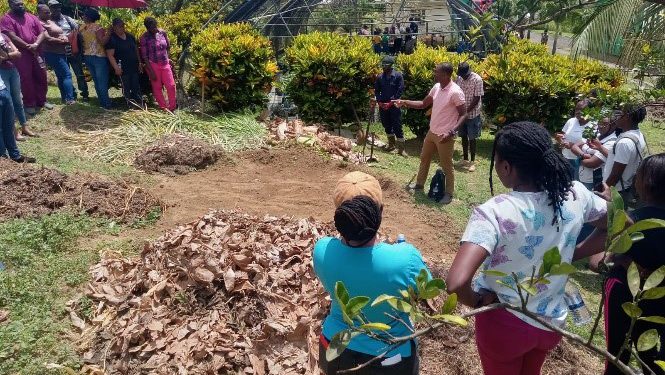Regional Workshops with industry experts provide extensive knowledge and practical lessons for better production
19 April 2023 – Bridgetown, Barbados – The Food and Agriculture Organization of the United Nations (FAO) in collaboration with The Ministries of Agriculture in Grenada, Saint Vincent and the Grenadines, Saint Lucia and the University of the West Indies, St Augustine Campus (UWI), successfully hosted three national workshops on “Cost-Effective Risk Management Options for Agriculture and Livelihoods”. The workshops provided practical recommendations for sustainable soil and livestock management in the countries as a response to the cascading effects of the ongoing global crises, including the COVID-19 pandemic, the Russia/Ukraine war, and climate change and feed and fertilizer availability and affordability. Against this daunting background, the topics and focus of the workshops were timely and relevant to the estimated 100 participants comprising of crop and livestock, extension officers and other representatives from the Ministry of Agriculture and agriculture students.
Around the world, many leaders have placed repeated emphasis and attention on protecting the earth’s natural resources, including soil management for future generations, and it is anticipated that renewed efforts will be made, as International Mother Earth Day will be celebrated globally on April 22.
Meanwhile, in the Caribbean, representatives from UWI St Augustine Campus, facilitated and led the presentations with experienced and knowledgeable professionals who also focused on soil management. The team comprised of Gaius Eudoxie – Soil Scientist, Janelle Joseph – Extension Expert, Nicholas Boodram – Research Assistant and Martin Hughes – Livestock Expert.
While Jeanelle Joseph and Nicholas Boodram presented on the project scope, outcomes, and main findings, as well as economic and social options, Gaius Eudoxie and Martin Hughes led the technical discussions, on soil resources, soil health and fertility, nutrient stewardship, soil amendments, and sustainable feeds and feeding strategies for livestock.
Eudoxie demonstrated compost tea making and fertilizer placement with emphasis on the 4Rs – using fertilizer from the right source, at the right rate, with the right frequency and the right placement. Though considered relatively small actions, when adopted by farmers they can make major differences.
He highlighted that International Mother Earth Day draws global attention to the way in which we humans interact with our planet and indicated that addressing the impacts of current global challenges including food security, conflict and climate change requires innovative and resilient use and management of earth resources. This is particularly important for SIDs with limited resources and small and emerging economies. Inputs into our productive land uses can either improve or lessen resilience, with the outcome strongly dependent on our ability to efficiently manage these systems.
Hughes provided guidance on ensuring the nutrient requirement of animals were met by using the right formulation of alternative feeds. He demonstrated the use of feed formulation software to create recipes using the byproducts of existing crops, including cassava skin, rice by product, pineapple peels and the process of pelleting the feed.
Raisa Spencer, Project Coordinator at FAO noted that, “The objective of the project was to provide cost effective options to farmers to counter the price increases in imported agricultural inputs (feed and fertilizers). We are very happy to have collaborated with the UWI to meet our project objective. The team was able to identify and showcase appropriate techniques such as the repurposing of crop waste as animal feed without compromising the nutrient content. Ultimately, we hope that the participants left training with new knowledge of these alternatives and how can improve the efficiency of their production, while reducing the strain on their finances”.
The participants actively engaged in discussions on the merits and labor requirements of different methods and shared their findings and perspectives on communal forage banks and the use of alternative feeds. As the workshops concluded, they expressed their appreciation for the knowledge and expertise shared during the workshop and acknowledged the collaborative efforts of the Ministries of Agriculture, FAO, and UWI in organizing such a valuable event. These workshops have been a crucial platform for building the capacity of agricultural stakeholders in cost-effective risk management techniques amidst the challenges posed by global crises. FAO remains committed to supporting the region in addressing the impacts of these crises on agriculture and livelihoods, and we are grateful for the collaboration with UWI and other partners in this joint project.
For more information, please contact:
Ms. Raisa Spencer
Project Coordinator Disaster Risk Management and Resilience.
FAO Sub-regional Office for the Caribbean
Marquita Sugrim
National Communication Consultant, Barbados and OECS
FAO Sub-regional Office for the Caribbean









